US judge: Senator Graham must testify in Georgia election probe
Lindsay Graham is scheduled to testify August 23 about his phone calls to the Georgia attorney general about the 2020 US election results.

A federal judge on Monday rejected US Senator Lindsey Graham’s challenge to a subpoena to testify before a grand jury in Georgia probing efforts by former President Donald Trump and his supporters to overturn his 2020 election defeat.
Graham, a Republican, had argued through his lawyers that his position as a US senator provided him immunity from having to appear before the investigative panel.
Keep reading
list of 4 itemsUS elections: Bernie Sanders campaigns for Michigan progressives
US elections: How pro-Israel spending affects Palestine advocacy
‘Better for democracy’: Two US cities offer Arabic voting ballots
US District Judge Leigh Martin May wrote in an order on Monday that immunities related to his role as a senator do not protect him from having to testify.
“The court finds that the District Attorney has shown extraordinary circumstances and a special need for Senator Graham’s testimony on issues relating to alleged attempts to influence or disrupt the lawful administration of Georgia’s 2022 elections,” May’s order said.
Graham’s subpoena instructs him to appear before the special grand jury on August 23 but he is expected to appeal the judge’s ruling.
Fulton County District Attorney Fani Willis opened the investigation last year, and a special grand jury with subpoena power was seated in May at her request. Last month she filed petitions seeking to compel testimony from seven Trump advisers and associates.
Trump has denied any wrongdoing, despite an hour-long call he made to Georgia Secretary of State Brad Raffensperger January 2, 2021 asking him to “find” 11,800 votes, enough to change the results of the election.
Prosecutors have indicated they want to ask Graham about phone calls they say he made to Raffensperger and his staff in the weeks following Trump’s election loss to Democrat Joe Biden.
Graham had argued that a provision of the Constitution provides absolute protection against a senator being questioned about legislative acts. But the judge found there are “considerable areas of potential grand jury inquiry” that fall outside that provision’s scope. The judge also rejected Graham’s argument that the principle of “sovereign immunity” protects a senator from being summoned by a state prosecutor.
Graham also argued that Willis, a Democrat, had not demonstrated extraordinary circumstances necessary to compel testimony from a high-ranking official. But the judge disagreed.
May, the judge, last month rejected a similar attempt by US Representative Jody Hice, a Republican representing Georgia, to avoid testifying before the special grand jury. Former New York mayor and Trump lawyer Rudy Giuliani had argued he could not travel to Atlanta to testify because of health issues, but Fulton County Superior Court Judge Robert McBurney, who is overseeing the special grand jury, instructed him to appear on Wednesday.
A Graham spokesperson, Kevin Bishop, said on Monday the senator had no comment but referred to what Graham said when asked about the probe last week. During a news conference in Columbia, South Carolina, Graham said, “We will take this as far as we need to take it” when asked about his efforts to fight his subpoena.
“I was chairman of the Senate Judiciary Committee and had to vote on certifying an election,” Graham told reporters. “This is ridiculous. This weaponisation of the law needs to stop. So I will use the courts. We will go as far as we need to go and do whatever needs to be done to make sure that people like me can do their jobs without fear of some county prosecutor coming after you.”
In calls made shortly after the 2020 general election, Graham “questioned Secretary Raffensperger and his staff about reexamining certain absentee ballots cast in Georgia in order to explore the possibility of a more favorable outcome for former President Donald Trump”, Willis wrote in a petition.
Graham also “made reference to allegations of widespread voter fraud in the November 2020 election in Georgia, consistent with public statements made by known affiliates of the Trump Campaign”, she wrote.
Republican and Democratic state election officials across the country, courts and even Trump’s attorney general found there was no evidence of any voter fraud sufficient to affect the outcome of his 2020 presidential election loss.
Georgia counted ballots three times with the result the same – a Biden win in the state.
The Georgia probe is one among several legal troubles faced by the former president, whose Florida home was searched by federal agents last week and whose role in the January 6, 2021 attack on the Capitol is being probed separately by a congressional panel.